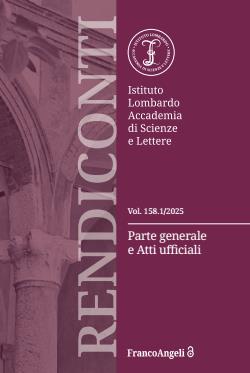- Stefano Maiorana, Premessa (Preamble)
- Istituto Lombardo, Statuto (Statute)
- Istituto Lombardo, Regolamento (Regulations)
- Istituto Lombardo, Il Capitale umano dell'Istituto Lombardo (The Human Capital of the Lombard Institute)
- Istituto Lombardo, Ripartizione dei Membri e dei Soci fra Classi e Sezioni (Distribution of Members and Associates among Classes and Sections )
- Istituto Lombardo, Membri e soci defunti (Members and partners deceased )
- Stefano Maiorana, Inaugurazione del 222° Anno Accademico (Inauguration of the 222nd Academic Year)
- Marco Bersanelli, Tra finito e infinito. La cognizione astronomica di Giacomo Leopardi (Between Finite and Infinite. The Astronomical Cognition of Giacomo Leopardi)
- Istituto Lombardo, Programma del concerto inaugurale (Inaugural concert programme)
- Stefano Maiorana, The present-day role of Academies in a changing world
- Rita Pezzola e lo staff dell'Istituto Lombardo, Il patrimonio librario internazionale dell’Istituto Lombardo: primi esiti da un progetto di ricerca (The International Book Heritage of the Lombard Institute: first results from a research project)
- Istituto Lombardo, Elenco dei libri presentati (List of books presented)
- Alfonso d'Agostino, Cristina Campiglio, Ferruccio Trifirò, Antonio Gambaro, Fabio Ragaini, Cesare Perotti, Anna Maria Finoli (†22 marzo 2020); Franco Mosconi (†18 marzo 2021); Italo Pasquon (†16 maggio 2021); Rodolfo Sacco (†21 marzo 2022); Sergio Cenini (†29 ottobre 2023); Giuseppe Cassinis (†14 novembre 2023). (Anna Maria Finoli (†22 marzo 2020); Franco Mosconi (†18 marzo 2021); Italo Pasquon (†16 maggio 2021); Rodolfo Sacco (†21 marzo 2022); Sergio Cenini (†29 ottobre 2023); Giuseppe Cassinis (†14 novembre 2023).)
Recensioni
- Vincenzo Ferrari, Reale M.C. (2022). L’autodisciplina pubblicitaria in Italia. Teoria e prassi di un sistema normativo semiautonomo. Milano: FrancoAngeli
- Ilaria Bonomi, Dionigi R. (2023). Le parole in chirurgia. Dal Medioevo al SARS-CoV-2, prefazione linguistica di Ilaria Bonomi e Riccardo Gualdo. Milano-Udine: Mimesis Edizioni
- Francesco Spera, Fabrizio Emanuele Della Seta, Bonomi I., Buroni E. e Spada M., a cura di (2023). Carteggio Verdi-Ghislanzoni (1870-1893). Parma: Istituto Nazionale di Studi Verdiani, 2 voll. [Edizione nazionale dei carteggi e dei documenti verdiani]
- Arianna Arisi Rota, Triola F. (2023). L’orologio del potere. Stato e misura del tempo nell’Italia contemporanea, 1749-1922. Bologna: il Mulino
